- Home
- Lise McClendon
Blackbird Fly Page 22
Blackbird Fly Read online
Page 22
Of course it wasn’t Château Gagillac. They didn’t bottle their own wine. There would be no Château Gagillac except in big plastic jugs, anytime soon. She looked at another case. ‘Château Buzet, Cru Bourgeois, 1988.’
She laid the bottle back in the wooden crate, running her fingers over its mates there, all alike. Similar crates with different wineries stamped on the sides were stacked in neat piles. Voices outside! She crept back to the window. Back over the sash she landed quietly on the grass then peeked around the corner of the chai. No one there, and the voices had gone too. Heart beating fast — what had she been thinking? — she walked slowly toward the house to get her instructions for the day.
The crunching of the stones under her shoes blotted out noises. She raised her left fist to knock on the door. There, again. Angry voices, from inside. She couldn’t follow the French, but it sounded like Gerard. Odile answered, equally fast and surprisingly loud, giving Gerard as good as he got. Unfortunately it seemed to set him off further. More yelling, then a bump. Had he hit her — or she him?
Before Merle could turn away from the door Gerard yanked it open, his face flushed with anger. He glared at her and slammed the door shut behind him, shoving past her then tramped up the path to the chai. He disappeared around the building.
Odile opened the door, her face placid and unreadable. Besides a little flush in the neck, you’d never know she’d just had a shouting match. A French thing, Merle supposed, being able to fume and shout then be sweet as pie.
The list of wine-tasters was long, fourteen people. Odile was her usual efficient self, and because of the language barrier, their conversation was over before it started. Odile sent her off as she stared out the window, worry creasing her face.
The tour group arrived in a small white bus, all British. They were a jolly, rosy-cheeked, limp-haired clan, and as they paid their money they joked with her. “How’d you break your arm, dearie? Stayin' clear from Frenchmen, was it?” “If it was you, Jack, it’d be from lifting drinks glasses.” “You seem to keep up, Terry. Not that there’s a contest.” “Lovely having a driver, isn’t it?” “A bit too lovely, if you ask me.”
Merle took the last man’s money, and opened the cash box to look for change. “There you are, sir.” She blinked at him. Anthony Simms again, with his bad hair — definitely a toupee — and doggy brown eyes.
He smiled sheepishly. “Hello, Merle. How are you?”
“Another tour?”
He shrugged, opened his mouth to answer. Merle straightened her shoulders as she saw the rest of the group was staring at them silently as if expecting a little entertainment.
“Ready? Let’s go to the vinification room and see how the grapes begin their journey into wine.”
Tours were shorter now, with the chai — where wine was aged — off-limits. She gave a little speech outside the locked doors to describe the oak barrels, explaining the process of selecting new and old barrels and why that was important, the special oak used to build them, the special coopers who did the work. The tourists didn’t seem to mind. The morning sun burned off the mist quickly and all felt the contentment of vacation in its rays. One couple kissed at the edge of the vines, much to their friends’ amusement.
In the tasting room they admonished each other to taste and spit and not drink too much and to ‘bottoms up.’ Anthony Simms stood alone, solemnly sipping and swirling his wine. As the tour ended, the Englishmen including Anthony digging in their wallets for sizable and very welcome tips, she ignored him. He walked out of the tasting room with the group. She was glad but not convinced she’d seen the end of him.
Back at the office, Odile didn’t answer the knock. The door was unlocked so she’d let herself in, piling half the money at the edge of Odile’s desk and scribbling a note.
Outside neither of the Langois was visible, nor the field crew who pruned and watered the vines. The bottles in the chai were a puzzle. Maybe Gerard wholesaled other wines on the side to make money. She changed her shoes in the tasting room, tied her sweater around her waist, and put on her sunglasses. It would be a hot walk back.
Simms waited by his car again, the only one in the gravel lot. He hadn’t gotten more attractive with time. In fact, just the opposite.
“Hello, Merle. Very nice tour, as usual.”
She stopped, crossing her arms. “Did you learn anything new?”
“You probably wonder why I’m here again. I can see you do. And,” he laughed at himself and stepped toward her, “I should explain. I wanted to see you again. But I couldn’t get up the nerve to just knock on your door.”
“And you, who know where I live.”
“And me a grown man, you can say it. It’s what you meant. I know. It’s silly. I get so — oh, you know. It’s crazy. I was hoping I could give you a ride home again? Please. I would like that.”
She felt the heat on the top of her head and wished she had a hat. The sweat was already collecting on her back. Yet she really didn’t want to ride with him again.
“Oh, come on. I’m not stalking you, is that what you think?”
She squinted at him. “It crossed my mind.”
He threw up both hands, palms out. “All right, I confess. I did walk by your house, twice, but I lost my nerve.” He looked concerned suddenly. “What did you do to your arm?”
“Fell off a ladder.” She sighed. “Look, Anthony. You’re a nice man and I would enjoy a cool ride back into town. But as I told you, I recently lost my husband. It probably doesn’t look like it but inside I am still mourning. It would be wrong for me to let you spend your money on me when nothing can come of it.”
A pretty speech. Being a cranky widow had to be good for something.
His smile frozen, he opened the car door. “A ride then, and nothing more.”
She straightened and closed the door. “Have a lovely afternoon.”
There was no way she was getting into that car again. He backed up and turned around, glaring at her. The walk home was very hot and her arm ached. A few cars passed going in the other direction. She kept an eye out for Anthony but he didn’t show. She didn’t have to jump into the ditch — this time.
As she turned onto rue de Poitiers, there he was. The white Peugeot sat in front of her house. The idiot. What did he think he was doing? She walked right up the sidewalk to her door and unlocked the padlock. He was out of his car in a flash.
“Merle, I want to apologize. I just thought we —”
She spun to face him. “No. I can see you are a gentleman. You have to respect that I am saying no.”
She fumbled with her key, her hands shaking a little as she shut the door behind her. He sat in his car, looking straight ahead out the windshield, fingers tight on the steering wheel. Drive away. He turned to look at the door and she jumped to the side. With a roar the Peugeot, and Anthony Simms, were gone.
For good, she hoped, pulling out some cheese for lunch. In the garden she could see eight shutters propped against the table, freshly painted. She shook out her shoulders, trying to dispel the unpleasantness of Anthony Simms. Had she seen the last of him? She fixed a plate of grapes and cheese and bread, poured two glasses of wine, and took the tray into the garden.
Pascal was under the cistern, washing his face and hands. “After lunch I turn them and paint the other side. Then take the others down.” She showed him the food. “I have to go play some cards today.”
“Ah, right. Use your charm and guile.”
“Charm? Moi? ”
She drank Pascal’s glass of wine as well as her own, then went upstairs to lie down. She gulped a couple aspirin for the ache in her arm. An old person’s siesta, for the widowed and the maimed.
She woke up groggy in the afternoon heat. The second-floor bedroom collected it, especially with the shutters off. A ceiling fan over the bed is what she needed. Another job for the electrician.
Pascal was lathering blue paint on the old wood shutters, some of which really should be replaced. Rebuil
ding a house, making it livable again, could become a mission. This house had become hers as much as it ever was Weston and Marie’s. It was Tristan’s birthright, his heritage. Maybe she wouldn’t have to sell it at all. The wine would be worth a few thousand dollars, maybe more. Maybe enough to keep the house until he went to college.
The rug warmed the room with its faded colors, despite the worn spots. Tristan’s little bed made a decent sofa, although she still wanted a gold chenille one, there in front of the fireplace. And an armchair, a big fat one to curl up in and read long novels on wintry days. She couldn’t imagine winter in the house, not when the weather was so hot. Would the house be drafty and cold? Did it get cold here, did it snow? She would come for Christmas, someday.
Someday.
On the way to the church the Bordeaux lawyer called her back. He promised to look into her case, to speak with the inspector and find out what progress was being made. She told him about her confiscated passport and demanded it back. He was polite, if not reassuring. He would call her back again with news, if he had any.
Madame Beaumount didn’t seem surprised to see her. Merle stuffed another bank note into the wooden box in the refectory and was led into the basement of the church again. Madame slapped the white gloves against her skirt to clean them and stared at Merle’s cast. The gloves were thin, stretching awkwardly over the cast on her right hand. When Madame saw that they would work she left her alone.
She found more names she recognized this time. Redier, Saintson, Taillard. An Yves Estephene Redier was baptized in Sept-ember, 1923. Another boy, born 1925 to the same parents. She found the marriage of the Sabatini’s. How had she missed it before? Josephine Chevalier had married the Italian in 1938. No sign of them after that.
According to the bartender the Chevaliers had moved away after the scandal. If Laurent Chevalier was Marie-Emilie’s father, he would be over ninety if he was still alive. Merle kept looking, searching for something she knew had to be here, if she just looked hard enough.
The hours passed quickly in the windowless basement. She went over the same pages, again and again. The routine was like preparing for a trial, looking for precedents, researching back and then back again, farther into history. Finally, when her back hurt and her eyes had begun to burn, there it was. Two names she knew, ‘Dominique’ and ‘Redier.’ She had looked at every ‘Dominique’ in the book. She wasn’t sure what she was looking at.
“Dominique Eloise Redier, baptized April 5, 1936.”
Her parents were listed as Andre Thomas Redier and Catherine-Juliet (nee de Neuvic). Backtracking she found the mother’s and father’s baptism, in 1918 and 1915. Marriage in 1935, and the father’s death in late 1936, just a month after his daughter’s birth. Dominique’s confirmation in 1946.
Merle scribbled down dates, names, then sat back in the hard chair, stretching her shoulders. Was this the Dominique of the letters? What was her connection with Marie-Emilie?
Merle pulled out “1950-2000.” In 1954 Catherine-Juliet remarried, to a man named Carlo Lombardi. Did Dominique marry? She may never have returned to Malcouziac.
Scanning the end of the 1950’s and half through the ‘60s Merle found nothing more. She must have missed something. Back to the beginning, she scanned the ‘50s where the handwriting was so flowery she had trouble reading it. It looked like the writer had gotten old and feeble. There, at the start, 1950, Dominique again. How had she missed her? A baby boy baptized. She was a mother, at, what? — fourteen. No father listed. No name for the baby, just “garcon.” Baptism was June 3.
Writing the information in the notebook she sat back, letting the information sink in. Harry was born in the village. His birthday was May 30, 1950. She felt a chill up her spine.
Could it be? Dominique was his mother? She scoured the births again, focusing hard on every entry for 1950. Only one fit his birth date.
Harry had been adopted? If he had known, he never mentioned it. But he never talked about his parents either. She searched for more on Dominique but found nothing.
But other Redier’s— 1971, another garcon Redier, Jean-Pierre, born to yet another brother. The gendarme — and the mayor —both related to Dominique. Merle straightened up the room, tore off the gloves, and ran up the stairs.
She watched the cobblestones, walking through the village, the names swimming in her head. Dominique Redier, daughter of Andre and Catherine-Juliet. Mother of Harry Strachie. If it was true, she had given birth at fourteen, then — who was Harry’s father?
Madame Suchet’s pea green door opened in a whoosh. Merle handed her a bouquet of red and pink roses in a vase. Madame sat her visitor down, insisting on slices of quatre quart, the ubiquitous pound cake. When she could wait no more, Merle interrupted a treatise on roses.
“Excusez-moi, madame. I have a question.”
Madame Suchet sat down in a yellow print chair. Merle asked, in French, “Did you know a young girl in the forties named Dominique Redier?”
“Ici? Dans la ville?”
“Oui.”
Yes, here in the village. Her brown eyes flicked to the window. She arranged her hands, took a deep breath and blew it out. Would she talk, that was what she was asking herself. Should she? Her eyes grazed Merle, then back to the window. A minute passed. Merle ate a bite of pound cake and silently begged for trust, for help. Then the older woman cleared her throat.
“She was two or three years younger than me. A pretty girl, a blond. I didn’t know her well.”
Merle felt her breath leaving her. Finally, someone was talking. “She grew up here.”
“I haven’t seen her since the war, since I left. I never heard of her again.”
“Do you know her mother, Catherine-Juliet Lombardi?”
Mme Suchet nodded. “She has been gone some years.”
“Died?” Another nod. The older woman was looking at her straight on now, as if waiting for the real question, begging her to ask. “I’m trying to track down Dominique. That little scandal attached to the house? I think I know what it was.”
Mme Suchet was silent in her assent. Merle waited, then blundered on, unsure how this next question would sit. “Did she — ” It seemed too impolite for the French of Mme Suchet’s generation. Was she knocked up, had an illegitimate child, got in the family way? What did you say? Merle searched for the words.
“I think she got herself in trouble.” No argument from the old woman. “Was there a place for young girls to go when they were—” She hesitated, searching for a term. “—Becoming a mother?”
Madame looked uncomfortable, then corrected her. “Avant d’accoucher.” Before the lying-in. “There was a convent. ”
Poking her head out the kitchen door, she wondered if Pascal had found out anything from the gendarme. He was still painting. She went back into the front room and stared at her notes from the parish records. Harry was adopted. It had to be true. He was born here, and there was no record of a birth at that time that could be him except Dominique Redier’s son. She got out the letters again. There was the line: ‘How is the boy?’ That was why she kept in touch. Dominique was Harry’s mother.
Merle was pouring herself a second glass of ordinary Gagillac wine when Pascal came to the door. “That for me?” His face was wet, his hair dripping on the stone floor. Pouring another glass, she carried both into the garden. Pascal was staring at the shutters as she handed him his wine.
She walked to the outhouse. “Do you think we’ll ever get in there again? Will they open it up?”
“I don’t know. And this pile of stones. What will you do with them?”
“Tristan can move them.” She sat on a metal chair in the last rays of sun. It felt warm and good. The wine was going to her head.
“Not another fight?” He perched on the low wall.
“Just fifteen year olds on the loose.” She leaned over her knees, her forearms on them, and stared at the mud by the patio edge. Harry, adopted. It wouldn’t sink in. She felt woozy in the even
ing heat. At her feet were stones, piles of dirt. The garden was a wreck, hardly the lovely place it had been when they’d arrived. Rocks, leaves, dead flowers, a nasty trench torn through. Their presence was disruptive, there was no denying it.
“I need more wine.” She rose unsteadily and headed toward the kitchen door. Pascal took her elbow before she got in the house.
“You need food. You and me, we go eat some dinner.”
Her head hurt as it spun. This garden. This nasty little town. She suddenly hated all of it. For so long this adventure, this summer, had been a dream, an idyll, but now she saw it for all it was — the death of an aging prostitute, a rundown house with a dark past, a village full of hateful strangers who decided before she arrived that they wanted nothing to do with her then proceeded to frame her for murder. And Annie! How could she come into all this, expecting lavender and cheese and loveliness? She covered her eyes with one hand.
“My sister’s coming and I don’t have anywhere for her to sleep. The garden’s a mess. There’s a hole in my ceiling. I’m suspected of murder. I broke my fricking arm. Why should I — ”
The glass slipped out of her hand and Pascal caught it. “Everything will seem more manageable after you eat. We don’t allow wine drinking without eating in France.”
“Is that so?” His face was dry now, his black curls hanging over his collar. His neck was caked with grime and small flakes of old blue paint. “You’re too dirty to eat in a restaurant.”
“You will come with me while I change my clothes.”
“No, I won’t.” He kissed her suddenly. The shock of his warm lips sobered her enough to know she really was tipsy. She pulled away from him and straightened herself.

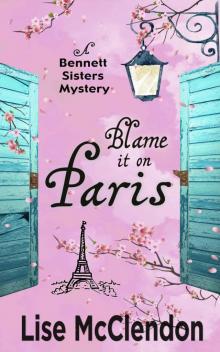 Blame it on Paris (Bennett Sisters Mysteries Book 7)
Blame it on Paris (Bennett Sisters Mysteries Book 7)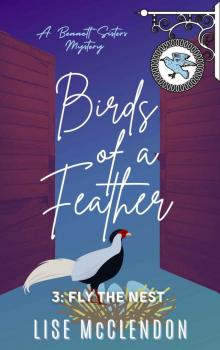 Birds of a Feather: 3: Fly the Nest (Bennett Sisters Mysteries Book 16)
Birds of a Feather: 3: Fly the Nest (Bennett Sisters Mysteries Book 16)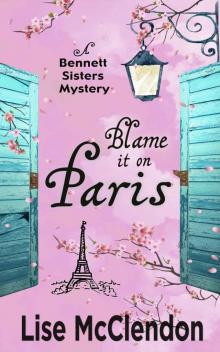 Blame it on Paris
Blame it on Paris The Things We Said Today
The Things We Said Today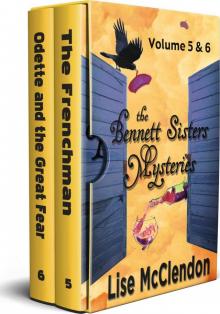 Bennett Sisters Mysteries Volume 5 & 6
Bennett Sisters Mysteries Volume 5 & 6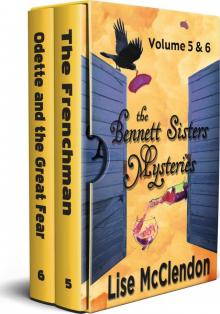 Bennett Sisters Mysteries Box Set 2
Bennett Sisters Mysteries Box Set 2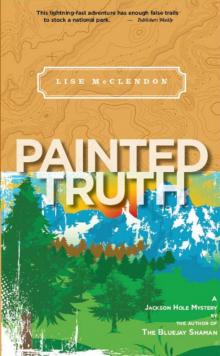 Painted Truth
Painted Truth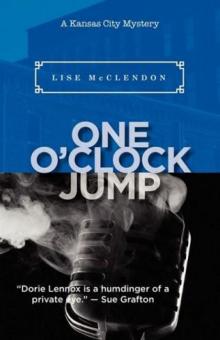 One O'Clock Jump
One O'Clock Jump The Bluejay Shaman (Alix Thorssen Mystery Series)
The Bluejay Shaman (Alix Thorssen Mystery Series) Swing Town Mysteries Dorie Lennox Box Set
Swing Town Mysteries Dorie Lennox Box Set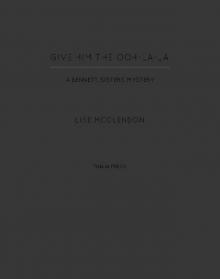 Give Him the Ooh-la-la
Give Him the Ooh-la-la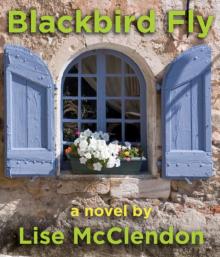 Blackbird Fly
Blackbird Fly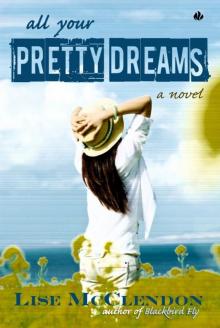 All Your Pretty Dreams
All Your Pretty Dreams Nordic Nights (The Alix Thorssen Mysteries)
Nordic Nights (The Alix Thorssen Mysteries)